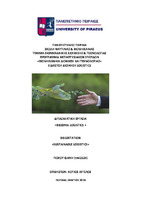Βιώσιμα logistics
Sustainable logistics

View/
Keywords
Sustainable logistics ; Last-mile logisticsAbstract
This thesis explores the pivotal role of sustainability in the context of last-mile logistics, examining its significance, challenges, and implications for the industry. It begins by discussing the overarching principles of sustainability and its application within the logistics sector, followed by an exploration of green logistics practices aimed at reducing carbon emissions and minimizing waste. The focus then shifts to the last mile, the final leg of the delivery process, where products are transported from distribution centers to end consumers. Despite its short distance, the last mile poses unique challenges and opportunities for sustainability initiatives. Strategies to optimize efficiency, reduce emissions, and enhance environmental performance in the last mile are examined in detail. Additionally, the thesis delves into reverse logistics, circular economy, and closed-loop logistics, which offer innovative approaches to resource utilization and waste management within the logistics ecosystem. Furthermore, it explores the transformative potential of Industry 4.0 technologies in enabling sustainable practices and driving operational efficiency throughout the logistics value chain. To provide practical insights, a comparative case study of two leading logistics providers, DHL and UPS, is included. By analyzing their sustainability initiatives, strategies, and performance metrics, the thesis elucidates the importance of sustainability in shaping the future of last-mile logistics. Overall, the thesis underscores the critical role of sustainability in fostering a more efficient, resilient, and environmentally responsible last-mile logistics ecosystem. It emphasizes the significance of sustainability in driving positive social, environmental, and economic outcomes within the logistics industry.


